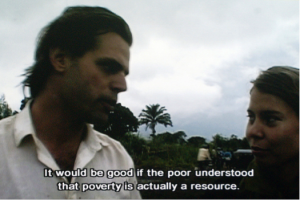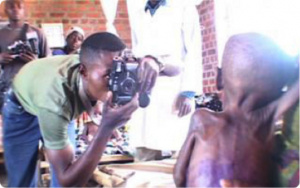Friday, February 7th: Imperial Debris: Roundtable with Ann Laura Stoler
February 07, 2014
1:30 pm - 4:00 pm
CUNY Graduate Center, Skylight Room
Friday, February 7th: Imperial Debris: Roundtable with Ann Laura Stoler
A Roundtable with Ann Laura Stoler (New School for Social Research) on the publication of Imperial Debris: On Ruins and Ruination (Duke University Press, 2013)
In conversation with Uday Mehta (The Graduate Center, CUNY) , Chelsea Shields (The Graduate Center, CUNY), Neferti Tadiar (Barnard College), Megan Vaughan (The Graduate Center, CUNY), Gary Wilder (The Graduate Center, CUNY).
Friday, February 7th 1:30pm to 4pm Skylight Room Graduate Center, CUNY 365 Fifth Ave, New York, NY 10016
Imperial Debris redirects critical focus from ruins as evidence of the past to “ruination” as the processes through which imperial power occupies the present. Ann Laura Stoler’s introduction, “The rot remains”: from ruins to ruination,” is a manifesto, a compelling call for postcolonial studies to expand its analytical scope to address the toxic but less perceptible corrosions and violent accruals of colonial aftermaths, as well as their durable traces on the material environment and people’s bodies and minds. 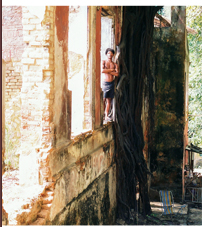 Contributors Nancy Hunt, E. Valentine Daniel, Greg Grandin, Sharad Chari, John Collins, Ariella Azoulay, Gastón Gordillo, Joseph Masco, and Vyjayanthi Rao offer provocative, tightly focused responses to Stoler, exploring subjects as seemingly diverse as villages submerged during the building of a massive dam in southern India, Palestinian children taught to envision and document ancestral homes razed by the Israeli military, and survival on the toxic edges of oil refineries and amid the remains of apartheid in Durban, South Africa. They consider the significance of Cold War imagery of a United States decimated by nuclear blast, perceptions of a swath of Argentina’s Gran Chaco as a barbarous void, and the enduring resonance, in contemporary sexual violence, of atrocities in King Leopold’s Congo. Reflecting on the physical destruction of Sri Lanka, on Detroit as a colonial metropole in relation to sites of ruination in the Amazon, and on interactions near a UNESCO World Heritage Site in the Brazilian state of Bahia, the contributors attend to present-day harms in the occluded, unexpected sites and situations where earlier imperial formations persist. Ann Laura Stoler is the Willy Brandt Distinguished University Professor of Anthropology and Historical Studies at the New School for Social Research. She is the author of Along the Archival Grain: Epistemic Anxieties and Colonial Common Sense and Carnal Knowledge and Imperial Power: Race and the Intimate in Colonial Rule. Her books Race and the Education of Desire: Foucault’s History of Sexuality and the Colonial Order of Things and Haunted by Empire: Geographies of Intimacy in North American History are both also published by Duke University Press.
Contributors Nancy Hunt, E. Valentine Daniel, Greg Grandin, Sharad Chari, John Collins, Ariella Azoulay, Gastón Gordillo, Joseph Masco, and Vyjayanthi Rao offer provocative, tightly focused responses to Stoler, exploring subjects as seemingly diverse as villages submerged during the building of a massive dam in southern India, Palestinian children taught to envision and document ancestral homes razed by the Israeli military, and survival on the toxic edges of oil refineries and amid the remains of apartheid in Durban, South Africa. They consider the significance of Cold War imagery of a United States decimated by nuclear blast, perceptions of a swath of Argentina’s Gran Chaco as a barbarous void, and the enduring resonance, in contemporary sexual violence, of atrocities in King Leopold’s Congo. Reflecting on the physical destruction of Sri Lanka, on Detroit as a colonial metropole in relation to sites of ruination in the Amazon, and on interactions near a UNESCO World Heritage Site in the Brazilian state of Bahia, the contributors attend to present-day harms in the occluded, unexpected sites and situations where earlier imperial formations persist. Ann Laura Stoler is the Willy Brandt Distinguished University Professor of Anthropology and Historical Studies at the New School for Social Research. She is the author of Along the Archival Grain: Epistemic Anxieties and Colonial Common Sense and Carnal Knowledge and Imperial Power: Race and the Intimate in Colonial Rule. Her books Race and the Education of Desire: Foucault’s History of Sexuality and the Colonial Order of Things and Haunted by Empire: Geographies of Intimacy in North American History are both also published by Duke University Press. 
Friday, March 14th: “Resistance Everywhere”: The Gezi Protests and Dissident Visions of Turkey
March 14, 2014 - March 27, 2014
6:30 pm - 8:30 pm
CUNY Graduate Center, Room C198
A discussion of the Gezi Park protests, which erupted in Istanbul in late May 2013 with Anthony Alessandrini, Jay Cassano, Louis Fishman, Aslı Iğsız, Elif Sarı, Cihan Tekay, and Emrah Yildiz. The event coincides with the publication of “Resistance Everywhere”: The Gezi Protests and Dissident Visions of Turkey, (Jadaliyya/Tadween Publishing), a collection of essays intended as a pedagogical resource for those teaching and studying recent events in Turkey.
Friday, March 21st: The Security Archipelago—Human-Security States, Sexuality Politics, and the End of Neoliberalism
March 21, 2014
12:00 am - 6:00 pm
Graduate Center, CUNY C201–202
Launch for a new book by Paul Amar: The Security Archipelago: Human-Security States, Sexuality Politics, and the End of Neoliberalism
Thursday, March 27th: Finding Something Different: Frantz Fanon and the Future of Cultural Politics: Book launch and Discussion with Anthony Alessandrini
March 27, 2014
4:30 pm - 6:30 pm
Graduate Center, Room 5109
A Book Launch and Discussion with Anthony Alessandrini, on the publication of Finding Something Different: Frantz Fanon and the Future of Cultural Politics (2013), with discussants J. Michael Dash, Professor of French, Social and Cultural Analysis, and Comparative Lit at NYU and Kandice Chuh, English Graduate Center.
Friday, April 4th: Critical Horizons: Beyond Marxism vs. Postcolonialism: A Symposium
April 04, 2014
9:30 am - 6:30 pm
CUNY Graduate Center, 5307
A symposium exploring the critical horizons of Marxism and Postcolonialism in contemporary social thought with papers by Vinay Gidwani, Anne-Maria Makhulu, Jini Kim Watson and comments by Ruth Wilson Gilmore.
Friday, April 25th: Globalizing Critical Theory: Symposium
April 25, 2014
1:00 pm - 5:15 pm
Graduate Center, Room C203/204
A symposium exploring the questions, conditions, and politics of global critical theory in the contemporary with papers by Souleymane Bachir Diagne, Manu Goswami, and Yoav DiCapua, and with comments by Uday Mehta.
Monday, May 5th: Rethinking the South African Crisis: Book Launch and Discussion
May 05, 2014
12:00 am
Bluestockings Books
Since the end of apartheid, South Africa has become an extreme but not exceptional embodiment of forces at play in many other regions of the world: intensifying inequality alongside ‘wageless life’; proliferating forms of protest and populist politics that move in different directions; and official efforts at containment ranging from liberal interventions targeting specific populations to increasingly common police brutality.
Rethinking the South African Crisis revisits longstanding debates to shed new light on the transition from apartheid. Drawing on nearly twenty years of ethnographic research, Hart argues that local government has become the key site of contradictions. Local practices, conflicts and struggles in the arenas of everyday life feed into and are shaped by simultaneous processes of de-nationalisation and re-nationalisation. Together they are central to understanding the erosion of ANC hegemony, and the proliferation of populist politics.
“Rethinking the South African Crisis shows how African theory can matter to the rest of the world. It’s a terrific analyti- cal model for pulling apart nationalism in its neoliberal forms, for understanding what happens when people get together and chant under the sign of Nike: USA! USA! USA!” —Raj Patel, author of Stuffed and Starved and The Value of Nothing
This book provides an innovative dialectical analysis of the ongoing, unstable and unresolved crisis in South Africa today. It also suggests how Gramsci’s concept of passive revolution, adapted and translated for present circumstances with the help of Fanon, can do useful analytical and political work in South Africa and beyond.
Gillian Hart is Professor of Geography and Co-Chair of Development Studies, University of California, Berkeley, and Honorary Professor, University of KwaZulu-Natal, South Africa. She is the author of Disabling Globalization: Places of Power in Post-apartheid South Africa (2002) and co-editor of Gramsci: Space, Nature, Politics (2013).
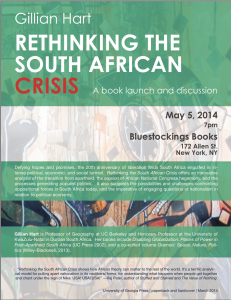 Gillian Hart is Professor of Geography at UC Berkeley and Honorary Professor at the University of KwaZulu-Natal in Durban South Africa. Her books include Disabling Globalization: Places of Power in Post-Apartheid South Africa (UC Press 2002), and a co-edited volume Gramsci: Space, Nature, Poli- tics (Wiley-Blackwell, 2013).
Gillian Hart is Professor of Geography at UC Berkeley and Honorary Professor at the University of KwaZulu-Natal in Durban South Africa. Her books include Disabling Globalization: Places of Power in Post-Apartheid South Africa (UC Press 2002), and a co-edited volume Gramsci: Space, Nature, Poli- tics (Wiley-Blackwell, 2013).
Friday, May 9th: Gentrifying the Congo: A Conversation with Artist Renzo Martens
May 09, 2014
4:30 pm - 6:30 pm
CUNY Graduate Center, Skylight Room
Renzo Martens is a controversial Dutch artist and filmmaker who in 2010 founded the Institute for Human Activities, an arts-based development program in Democratic Republic of Congo that brings together artists, thinkers and specialists. With a nod to precedents in cities like New York and Berlin, the Institute aims to turn art production into an engine of economic growth in Congo, hoping to improve the lives of the people around its settlement. Renzo will present the Institute of Human Activities and discuss its relationship to his previous work in the Congo, the documentary film Episode III: Enjoy Poverty.
In conversation with Claire Bishop (Art History, Graduate Center, CUNY) and Ashley Dawson (English, College of Staten and Graduate Center, CUNY).
Please join us for a screening of Martens’ film, Enjoy Poverty before the event.
Screening
4:30–6PM
Room 3416
Presentation and Discussion
6:30PM
Skylight Room, CUNY Graduate Center
Cosponsored by the Andrew W. Mellon Committee on Globalization and Social Change, the PhD Program in Art History, and the Center for the Humanities.
They Can’t Represent Us! Reinventing Democracy from Greece to Occupy
September 16, 2014
4:30 pm - 6:30 pm
CUNY Graduate Center, Skylight Room
Marina Sitrin (Visiting Scholar, Center for Place Culture, and Politics, CUNY Graduate Center) and Dario Azzelini (Institute for Sociology, Johannes Kepler University, Linz, Austria) present their new book.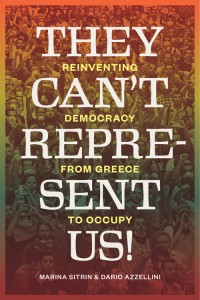
Tuesday, September 16th
4:30-6:30pm
Room 5109
CUNY Graduate Center
365 5th Ave. New York, NY 10016
*This event is co-sponsored by the Center for Place, Culture, and Politics.
They Can’t Represent Us! describes how the new global movements are putting forward a radical conception of democracy, often using the voices of the movement participants themselves. Mass movements in disparate places such as Greece, Spain, Argentina, and the United States ultimately share an agenda—to raise the question of what democracy should mean. These horizontalist movements, including Occupy, exercise and claim participatory democracy as the ground of revolutionary social change today.
Written by two international activist intellectuals and based on extensive interviews with movement participants in Spain, Greece, Venezuela, Argentina, across the United States, and elsewhere, this book is an expansive portrait of the assemblies, direct democracy forums, and organizational forms championed by the new movements, as well as an analytical history of direct and participatory democracy from ancient Athens to Zuccotti Park. The new movements put forward the idea that liberal democracy is not democratic, nor was it ever.
 Marina Sitrin is a Visiting Scholar at the Center for Place Culture and Politics at the City University of New York Graduate Center. She holds a PhD in Global Sociology and JD in International Women’s Human Rights. She is the author of Horizontalism: Voices of Popular Power in Argentina (AK Press, 2006) Everyday Revolutions: Horizontalism and Autonomy in Argentina (Zed Books: 2012). Her work focuses on social movements and justice, specifically looking at new forms of social organization, such as autogestión, horizontalidad, prefigurative politics and new affective social relationships. She bases much of her work in experiences in Latin America, and has lived in Argentina and Cuba. Her current research encompasses the new global movements, including those in Greece, Spain, Turkey, Brazil and Occupy in the US. She is currently writing a book on the meaning of social movements, challenging the framework used by contemporary social scientists so as to encompass the experiences and theories of current societies in movement. Marina’s writing has been published in: Dissent!; The International Journal of Comparative Sociology; NACLA; The Nation; Open Democracy; Tidal; Prensa Latina; The South Atlantic Quarterly; Upping the Anti; The Journal of Aesthetics and Protest; Yes! Magazine and Znet among others.
Marina Sitrin is a Visiting Scholar at the Center for Place Culture and Politics at the City University of New York Graduate Center. She holds a PhD in Global Sociology and JD in International Women’s Human Rights. She is the author of Horizontalism: Voices of Popular Power in Argentina (AK Press, 2006) Everyday Revolutions: Horizontalism and Autonomy in Argentina (Zed Books: 2012). Her work focuses on social movements and justice, specifically looking at new forms of social organization, such as autogestión, horizontalidad, prefigurative politics and new affective social relationships. She bases much of her work in experiences in Latin America, and has lived in Argentina and Cuba. Her current research encompasses the new global movements, including those in Greece, Spain, Turkey, Brazil and Occupy in the US. She is currently writing a book on the meaning of social movements, challenging the framework used by contemporary social scientists so as to encompass the experiences and theories of current societies in movement. Marina’s writing has been published in: Dissent!; The International Journal of Comparative Sociology; NACLA; The Nation; Open Democracy; Tidal; Prensa Latina; The South Atlantic Quarterly; Upping the Anti; The Journal of Aesthetics and Protest; Yes! Magazine and Znet among others.
 Dario Azzelini is an Assistant Professor at the Institute for Sociology at the Johannes Kepler University (Linz, Austria), a writer and documentary film director. He holds PhDs in political science and sociology. His research and writing focuses on social transformation, migration and racism, self administration, workers control and extensive case studies in Latin America. He serves as Associate Editor for WorkingUSA and for Cuadernos de Marte (University of Buenos Aires).
He has published several books, essays and documentaries about social movements, privatization of military services, migration and racism, Italy, Mexico, Nicaragua, Colombia and Venezuela. Among them “Das Unternehmen Krieg” (Assoziation, A 2002), a book about privatization of military services, translated and published in Germany, Argentina, Bolivia, France, Indonesia, Italy, Spain and Venezuela. More information: www.azzellini.net. He recently published together with Marina Sitrin “Occupying Language” (Occupied Media Pamphlet, 2012), “Partizipation, Arbeiterkontrolle und die Commune (VSA, 2010)”, the documentary “Comuna under construction” (2010) about local self government in Venezuela, and together with Immanuel Ness “Ours to Master and to Own: Workers’ Control from the Commune to the Present” (Haymarket, 2011). He served as Associate Editor for the The International Encyclopedia of Revolution and Protest: 1500 to Present (Wiley-Blackwell, 2009) and was primary editor for Latin America, the Spanish Caribbean, and the new left in Italy.
Dario Azzelini is an Assistant Professor at the Institute for Sociology at the Johannes Kepler University (Linz, Austria), a writer and documentary film director. He holds PhDs in political science and sociology. His research and writing focuses on social transformation, migration and racism, self administration, workers control and extensive case studies in Latin America. He serves as Associate Editor for WorkingUSA and for Cuadernos de Marte (University of Buenos Aires).
He has published several books, essays and documentaries about social movements, privatization of military services, migration and racism, Italy, Mexico, Nicaragua, Colombia and Venezuela. Among them “Das Unternehmen Krieg” (Assoziation, A 2002), a book about privatization of military services, translated and published in Germany, Argentina, Bolivia, France, Indonesia, Italy, Spain and Venezuela. More information: www.azzellini.net. He recently published together with Marina Sitrin “Occupying Language” (Occupied Media Pamphlet, 2012), “Partizipation, Arbeiterkontrolle und die Commune (VSA, 2010)”, the documentary “Comuna under construction” (2010) about local self government in Venezuela, and together with Immanuel Ness “Ours to Master and to Own: Workers’ Control from the Commune to the Present” (Haymarket, 2011). He served as Associate Editor for the The International Encyclopedia of Revolution and Protest: 1500 to Present (Wiley-Blackwell, 2009) and was primary editor for Latin America, the Spanish Caribbean, and the new left in Italy.
Book Discussion–Anthony Alessandrini’s Frantz Fanon and the Future of Cultural Politics: Finding Something Different
September 26, 2014
2:00 pm - 4:00 pm
Graduate Center, CUNY Room 5409
 Anthony Alessandrini is an Assistant Professor of English at Kingsborough Community College, CUNY. His new book Frantz Fanon and the Future of Cultural Politics focuses on a reading of Frantz Fanon’s work and life, asking how the work of a revolutionary writer such as Fanon might be best appropriated for contemporary political and cultural issues.
Anthony Alessandrini is an Assistant Professor of English at Kingsborough Community College, CUNY. His new book Frantz Fanon and the Future of Cultural Politics focuses on a reading of Frantz Fanon’s work and life, asking how the work of a revolutionary writer such as Fanon might be best appropriated for contemporary political and cultural issues.






